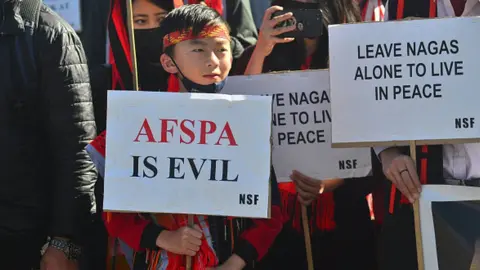AFSPA: Areas under draconian law reduced in India's north-east
 Getty Images
Getty ImagesAuthorities have withdrawn a controversial anti-insurgent law from large parts of north-eastern India after decades.
Home Minister Amit Shah said that areas covered under the Armed Forces Special Powers Act (AFSPA) in the states of Nagaland, Assam and Manipur would be reduced from Friday.
India introduced AFSPA in 1958 to put down separatist movements.
The law was first enforced in Manipur and later extended to other states.
It is also in effect in Indian-administered Kashmir where it was imposed after the outbreak of armed insurgency in 1989.
Mr Shah said AFSPA had been lifted completely in 23 of Assam's 32 districts and partially in one. The law has been in effect in the state since 1990.
The law had also been removed from areas falling under 15 police stations in six districts of Manipur and an equal number of police stations in seven districts of Nagaland, he said.
Ethnic groups in north-east India have long opposed the law, which empowers Indian security forces to conduct operations anywhere and arrest anyone without any prior warrant. It also protects soldiers who may kill a civilian by mistake or in unavoidable circumstances during an operation.
The law can be imposed in an area or a region for six months at a time and can be extended if deemed necessary by the government.
Human rights campaigners say AFSPA is often misused and have called for its repeal for decades.
Calls to repeal the law intensified after six civilians were killed in an army ambush in Nagaland's Mon district in December. Eight more civilians died after troops shot at angry protesters who attacked the army's camp.
The law will, however, continue to remain in effect in Mon.
Mr Shah said the law was being withdrawn because of the "improved security situation" and several agreements to end insurgency in the northeast and "bring lasting peace" in the region.
The move has been welcomed by the chief ministers of Assam, Nagaland and Manipur.
Allow X content?

Irom Sharmila Chanu, an activist in Manipur, spent 16 years on a protest fast against the law. She broke her fast - described as the world's longest hunger strike- in 2016.
The state of Tripura had revoked AFSPA in 2015. It was withdrawn in Meghalaya in 2018.
But the law remains in effect in parts of Arunachal Pradesh. On Friday, the government extended AFSPA in three districts of the state.

You may also be interested in:

